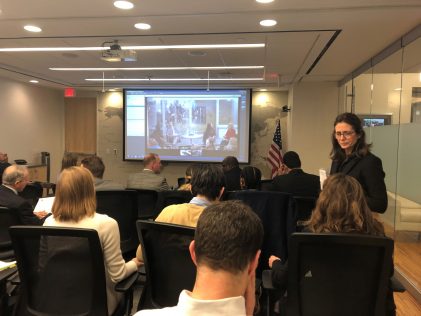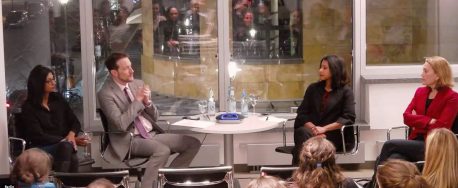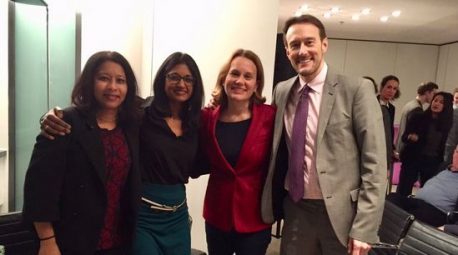
Attendees to the event arrived at the three venues at 6 PM in Berlin and at 12 noon in New York and Washington, DC. Refreshments were provided in all the venues and conversation/networking took place for the first 25 minutes in each location. Cultural Vistas provided conference room space at each of their offices free of charge. Fred Reinke, who works for Dentons in Washington, DC, helped arranged for the free use of the office space at Dentons in Berlin.
Prior to attendees arriving, all three venues were connected via video conference utilizing Adobe Connect which was coordinated by Mike Hoffmann, the IT Director at Cultural Vistas, together with staff at Dentons in Berlin. A test had been performed one week prior to the event. The video conference was set up such that all three venues appeared on the video screens at each venue. The panelists were visible in the largest window on the screen while the audiences in New York and Washington were visible in smaller windows. The attendees in Berlin looked directly at the panel rather than at the video screens.
At 6:30 PM in Berlin and 12:30 PM in New York and Washington, DC, Brent, who moderated the event, began the discussion introducing Julie, Sudha and Sumi, making note that all four of them were Bosch Fellowship alumni living in Berlin and providing some information on their professional backgrounds. Brent then moderated a 45-minute discussion with the panelists, engaging them on a range of issues including: key issues confronting the transatlantic relationship; issues challenging domestic German politics; the change in tone of German politics and rise in polarization and lack of trust in institutions, the re-ordering of the German party system with rise of AfD, increased support for the Greens, and the weakening of the SPD and CDU; Merkel’s impact on German politics and her transition; and the impact of Brexit on Germany and the European Union.

For the 30-minute Q&A segment, the video screens were adjusted so that each venue was visible in a larger window to encourage more interaction, i.e. questions, from each location. Brent then took a number of questions from the audiences in all three venues and had the panelists address them.
Overall, the event provided an excellent discussion on current issues in German politics. It was great to have four Bosch alumni together to demonstrate the expertise they have on Germany and German-American affairs. In conversations with attendees at each of the locations, the general sentiment was that the format and tech setup worked very well – there were no problems with audio or video in any of the locations. People liked how audiences were brought together in all three locations. Should this format be utilized again, a few recommendations include:
- Using a tech platform that allows for livestreaming to a broader audience beyond the specific venues. This will allow for greater engagement and impact.
- Consider having panelists in each of the venues to enhance audience engagement at each venue. It’s not easy for attendees in the remote locations to feel as “connected” when the entire panel is located somewhere else. However, having panelists in each location would bring its own set of challenges, such as more difficult conversation and interaction between the panelists, which for this event, was very good and well-received.
- A slightly higher budget to ensure catering costs can be covered.

The specific combination of Brent, Julie, Sudha and Sumi worked very well and consideration should be given as to how they could be brought together again to share their expertise and engage in discussion with American audiences.
